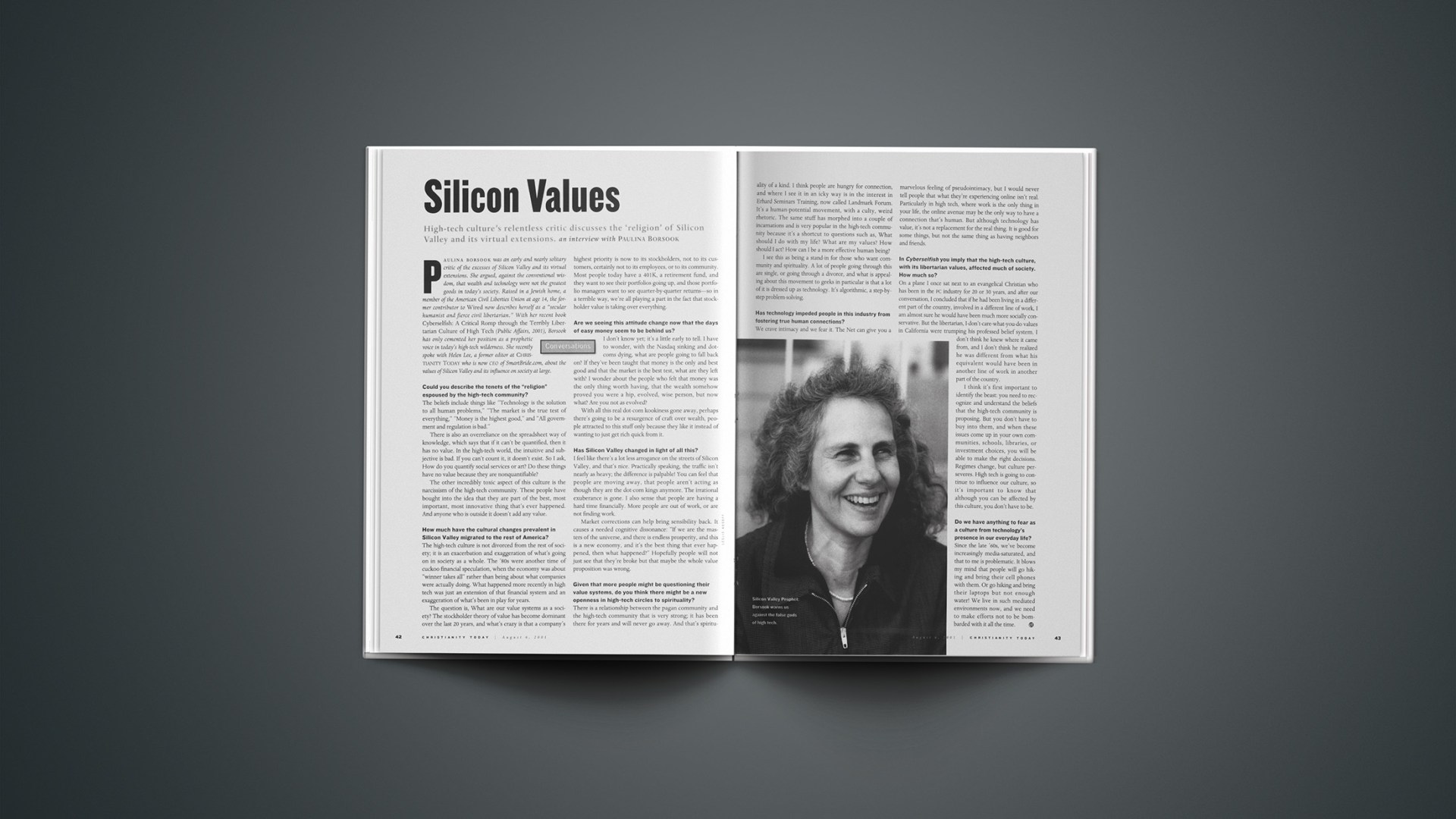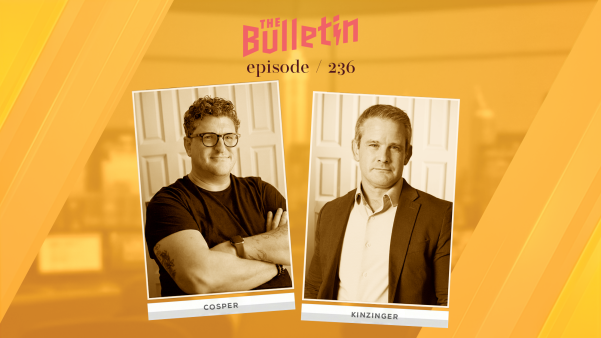Paulina Borsook was an early and nearly solitary critic of the excesses of Silicon Valley and its virtual extensions. She argued, against the conventional wisdom, that wealth and technology were not the greatest goods in today’s society. Raised in a Jewish home, a member of the American Civil Liberties Union at age 14, the former contributor to Wired now describes herself as a “secular humanist and fierce civil libertarian.” With her recent book Cyberselfish: A Critical Romp through the Terribly Libertarian Culture of High Tech (Public Affairs, 2001), Borsook has only cemented her position as a prophetic voice in today’s high-tech wilderness. She recently spoke with Helen Lee, a former editor at Christianity Today who is now CEO of SmartBride.com, about the values of Silicon Valley and its influence on society at large.
Could you describe the tenets of the “religion” espoused by the high-tech community?
The beliefs include things like “Technology is the solution to all human problems,” “The market is the true test of everything,” “Money is the highest good,” and “All government and regulation is bad.”
There is also an overreliance on the spreadsheet way of knowledge, which says that if it can’t be quantified, then it has no value. In the high-tech world, the intuitive and subjective is bad. If you can’t count it, it doesn’t exist. So I ask, How do you quantify social services or art? Do these things have no value because they are nonquantifiable?
How much have the cultural changes prevalent in Silicon Valley migrated to the rest of America?
The other incredibly toxic aspect of this culture is the narcissism of the high-tech community. These people have bought into the idea that they are part of the best, most important, most innovative thing that’s ever happened. And anyone who is outside it doesn’t add any value.
The high-tech culture is not divorced from the rest of society; it is an exacerbation and exaggeration of what’s going on in society as a whole. The ’80s were another time of cuckoo financial speculation, when the economy was about “winner takes all” rather than being about what companies were actually doing. What happened more recently in high tech was just an extension of that financial system and an exaggeration of what’s been in play for years.
The question is, What are our value systems as a society? The stockholder theory of value has become dominant over the last 20 years, and what’s crazy is that a company’s highest priority is now to its stockholders, not to its customers, certainly not to its employees, or to its community. Most people today have a 401K, a retirement fund, and they want to see their portfolios going up, and those portfolio managers want to see quarter-by-quarter returns—so in a terrible way, we’re all playing a part in the fact that stockholder value is taking over everything.
Are we seeing this attitude change now that the days of easy money seem to be behind us?
I don’t know yet; it’s a little early to tell. I have to wonder, with the Nasdaq sinking and dot-coms dying, what are people going to fall back on? If they’ve been taught that money is the only and best good and that the market is the best test, what are they left with? I wonder about the people who felt that money was the only thing worth having, that the wealth somehow proved you were a hip, evolved, wise person, but now what? Are you not as evolved?
Has Silicon Valley changed in light of all this?
With all this real dot-com kookiness gone away, perhaps there’s going to be a resurgence of craft over wealth, people attracted to this stuff only because they like it instead of wanting to just get rich quick from it.
I feel like there’s a lot less arrogance on the streets of Silicon Valley, and that’s nice. Practically speaking, the traffic isn’t nearly as heavy; the difference is palpable! You can feel that people are moving away, that people aren’t acting as though they are the dot-com kings anymore. The irrational exuberance is gone. I also sense that people are having a hard time financially. More people are out of work, or are not finding work.
Given that more people might be questioning their value systems, do you think there might be a new openness in high-tech circles to spirituality?
Market corrections can help bring sensibility back. It causes a needed cognitive dissonance: “If we are the masters of the universe, and there is endless prosperity, and this is a new economy, and it’s the best thing that ever happened, then what happened?” Hopefully people will not just see that they’re broke but that maybe the whole value proposition was wrong.
There is a relationship between the pagan community and the high-tech community that is very strong; it has been there for years and will never go away. And that’s spirituality of a kind. I think people are hungry for connection, and where I see it in an icky way is in the interest in Erhard Seminars Training, now called Landmark Forum. It’s a human-potential movement, with a culty, weird rhetoric. The same stuff has morphed into a couple of incarnations and is very popular in the high-tech community because it’s a shortcut to questions such as, What should I do with my life? What are my values? How should I act? How can I be a more effective human being?
Has technology impeded people in this industry from fostering true human connections?
I see this as being a stand-in for those who want community and spirituality. A lot of people going through this are single, or going through a divorce, and what is appealing about this movement to geeks in particular is that a lot of it is dressed up as technology. It’s algorithmic, a step-by-step problem-solving.
We crave intimacy and we fear it. The Net can give you a marvelous feeling of pseudointimacy, but I would never tell people that what they’re experiencing online isn’t real. Particularly in high tech, where work is the only thing in your life, the online avenue may be the only way to have a connection that’s human. But although technology has value, it’s not a replacement for the real thing. It is good for some things, but not the same thing as having neighbors and friends.
In Cyberselfish you imply that the high-tech culture, with its libertarian values, affected much of society. How much so?
On a plane I once sat next to an evangelical Christian who has been in the pc industry for 20 or 30 years, and after our conversation, I concluded that if he had been living in a different part of the country, involved in a different line of work, I am almost sure he would have been much more socially conservative. But the libertarian, I-don’t-care-what-you-do values in California were trumping his professed belief system. I don’t think he knew where it came from, and I don’t think he realized he was different from what his equivalent would have been in another line of work in another part of the country.
I think it’s first important to identify the beast: you need to recognize and understand the beliefs that the high-tech community is proposing. But you don’t have to buy into them, and when these issues come up in your own communities, schools, libraries, or investment choices, you will be able to make the right decisions. Regimes change, but culture perseveres. High tech is going to continue to influence our culture, so it’s important to know that although you can be affected by this culture, you don’t have to be.
Do we have anything to fear as a culture from technology’s presence in our everyday life?
Since the late ’60s, we’ve become increasingly media-saturated, and that to me is problematic. It blows my mind that people will go hiking and bring their cell phones with them. Or go hiking and bring their laptops but not enough water! We live in such mediated environments now, and we need to make efforts not to be bombarded with it all the time.
Copyright © 2001 Christianity Today. Click for reprint information.
Related Elsewhere
Last week, Christianity Today examined how Christians are influencing Silicon Valley. Articles in that package include:Silicon Saints | High-tech Christian executives are bringing biblical values into a mecca of Mammon. (July 27, 2001)
A Church for Internet Entrepreneurs | Grace Presbyterian had a Web site before it even had Sunday services. (July 27, 2001)
Reporting with the Top Down | Behind Tony Carnes’s reporting on Silicon Valley churches. (July 27, 2001)
“Cyberselfish” originally appeared as an essay in Mother Jones, which also published a follow-up article.
Cyberselfish.com offers excerpts from the book and information about Boorsook.
Archived Wired magazine articles by Borsook include “The Anarchist,” “How Anarchy Works,” and “The Accidental Zillionaire.”
Borsook’s Cyberselfish: A Critical Romp through the Terribly Libertarian Culture of High Tech is available at Amazon.com and other book retailers. Audible.com has it in audio format.
“The Silicon Valley” name is derived from the dense concentration of electronics and computer companies there since the mid-20th century.
Helen Lee, formerly of Christianity Today, is now CEO of SmartBride.com and assistant publisher of re:generation quarterly.










